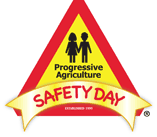Progressive Agriculture Foundation provides safety tips to help parents and children understand and prevent food poisoning.
 During National Farm Safety and Health Week, Sept. 1824, 2011, the Progressive Agriculture Foundation® (PAF) reminds parents that keeping children safe from food-borne illnesses is a year-round job.
During National Farm Safety and Health Week, Sept. 1824, 2011, the Progressive Agriculture Foundation® (PAF) reminds parents that keeping children safe from food-borne illnesses is a year-round job.Food-borne illnesses can be very dangerous, especially because food contaminated with harmful organisms, such as bacteria or parasites, does not always look or smell bad. However, consuming contaminated food can lead to illness and, in extreme cases, death. Improper handling, storage, preparation or poor hygiene practices can cause food to become contaminated. Children are especially susceptible to food-borne illnesses because of less-developed immune systems.
"For most adults, it makes sense not to leave food out of the refrigerator for long periods of time, or not to eat meat that hasn't been fully cooked. It's important that we teach these lessons to our children at a young age so that they can protect themselves from eating food that might make them sick," says Bernard Geschke, PAF program specialist from Papillion, Neb.
There are many ways to prevent contamination of food. PAF offers parents the following points to help children understand why some foods might make them sick if improperly handled:
Make sure that animal food products (dairy, meat and eggs) are cooked to a safe temperature by using a meat thermometer to check if you are unsure. Most of these foods must reach an internal temperature of 165 degrees to be considered safe.
Keep food either hot (140 degrees F or above) or cold (40 degrees F or below).
Wash your hands, all surfaces and utensils carefully, using antibacterial soap before and after handling meat, eggs or poultry, to prevent the spread of bacteria.
Wash raw fruit and vegetables before eating to remove any bacteria, parasites, dirt or pesticides.
Refrigerate perishable food within two hours of purchasing.
Thaw food in the fridge instead of at room temperature to ensure it stays safe.
When in doubt, throw it out. If you're unsure as to whether your food is safe to eat or not, throw it away.
Safety tips such as these are examples of the things children learn when they attend Progressive Agriculture Safety Days®, which are held each year in approximately 400 local communities throughout North America.
Safety Days are fun, hands-on, one-day events that provide children with education and training that can keep them and those around them safer and healthier on a farm or ranch, and at home. The program explores more than 30 topics, including ATVs, firearms, water/outdoor safety and knife safety. PAF provides the curriculum, coordinator training, take-home bags, T-shirts and other resources to help make the Safety Days a reality. PAF is committed to providing farm and ranch safety and health education to children across rural America in an effort to reduce farm- or ranch-related injuries and death.
ABOUT PROGRESSIVE AGRICULTURE FOUNDATION
The Progressive Agriculture Safety Day program is the largest rural safety and health education program for children in North America and a program of the Progressive Agriculture Foundation, a 501(c)(3) charitable foundation. The Foundation's mission is to provide education and training to make farm, ranch and rural life safer and healthier for children and their communities. In 2008, PAF was awarded the Better Business Bureau Wise Giving Alliance National Charity Seal, demonstrating its commitment to accountability and ethical practices. Safety Day applications are due each July 15 for Safety Days that will be conducted the following calendar year.
09.14.2011